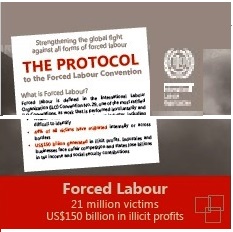
Forced labour is defined in the International Labour Organization (ILO) Convention No. 29, one of the most ratified ILO Conventions, as work that is performed involuntarily and under coercion. It can take place in any industry, including in the informal economy. Many victims, in particular women and girls, are subjected to commercial sexual exploitation, but forced labour is also prevalent in sectors such as agriculture, fishing, domestic work, construction, manufacturing and mining. It includes men, women and children in situations of debt bondage, suffering slavery-like conditions or who have been trafficked.
What is Forced Labour?
Forced labour is defined in the International Labour Organization (ILO) Convention No. 29, one of the most ratified ILO Conventions, as work that is performed involuntarily and under coercion. It can take place in any industry, including in the informal economy. Many victims, in particular women and girls, are subjected to commercial sexual exploitation, but forced labour is also prevalent in sectors such as agriculture, fishing, domestic work, construction, manufacturing and mining. It includes men, women and children in situations of debt bondage, suffering slavery-like conditions or who have been trafficked.
PROTOCOL
